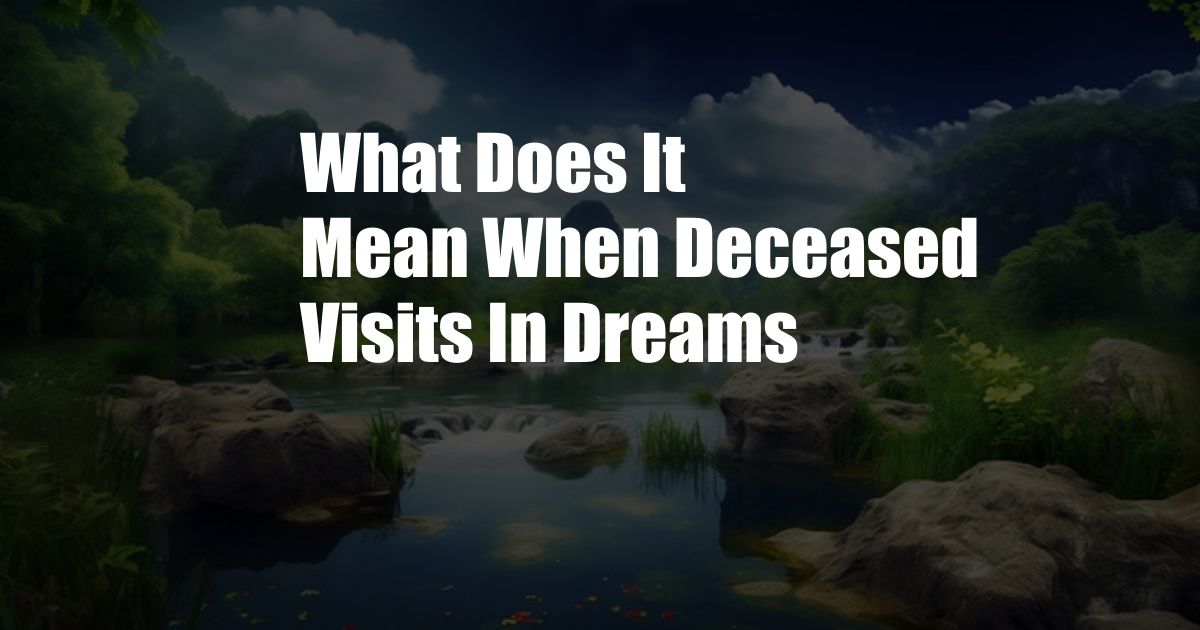
What Does It Mean When Deceased Visit in Dreams?
In the tapestry of dreams, the arrival of a deceased loved one can be both a comforting and enigmatic experience. While many cultures interpret such visits as a sign of remembrance, spiritual guidance, or unresolved emotions, unlocking their true meaning requires a deeper exploration of our own beliefs, emotional state, and the context of the dream.
The significance of deceased visits in dreams often lies in the personal connection shared between the dreamer and the deceased individual. These dreams may serve as a way for the dreamer to process grief, honor the memory of their loved one, or seek closure on unresolved issues. The emotional tone of the dream, whether it’s comforting, unsettling, or nostalgic, can provide further insights into the nature of the deceased’s presence.
Messages from Beyond
Many cultures believe that deceased individuals visit in dreams to convey messages or offer guidance. These messages may be subtle, appearing as a gesture, a spoken word, or a symbolic object. To decipher their meaning, it’s essential to pay attention to the context of the dream and the emotional response it evokes. If the deceased appears troubled or communicates a specific need, it could be a sign of unresolved matters or a request for support from the dreamer.
Alternatively, deceased visits may bring messages of comfort, reassurance, or guidance. They may appear in the dream as a source of wisdom, offering advice or encouragement during challenging times. In these instances, the deceased may represent a part of the dreamer’s own psyche, embodying their inner strength and resilience.
Unresolved Emotions
Dreams involving deceased loved ones can also surface unresolved emotions. For example, if the dreamer has unresolved grief or guilt, the deceased may appear in the dream as a way to facilitate closure. Through interaction with their loved one in the dream, the dreamer may gain a sense of forgiveness, acceptance, or a renewed appreciation for their relationship.
Conversely, deceased visits may also trigger feelings of guilt, regret, or unresolved conflicts. These dreams can be challenging but offer an opportunity for the dreamer to address these emotions and find ways to reconcile with the past. By acknowledging and processing these feelings, the dreamer can move forward with a sense of peace and acceptance.
Symbolism and Interpretation
The specific symbols and imagery present in deceased visits can also provide valuable insights. For instance, if the deceased appears in a dream as a child, it may represent a part of the dreamer’s own inner child or a longing for innocence and vulnerability. Alternatively, if the deceased is seen in a setting associated with their life or interests, it could be a reminder of the shared memories and bonds that still resonate within the dreamer’s heart.
Interpreting deceased visits in dreams is highly personal and subjective. There is no one-size-fits-all approach. Emotional state, cultural beliefs, and individual beliefs influence the meaning and significance of these dreams. By carefully considering the context, emotions, and symbolism involved, dreamers can gain valuable insights into their relationships with the deceased, unresolved emotions, and their own inner journey.
Tips for Navigating Deceased Visits in Dreams
- Be open and receptive: Approach deceased visits in dreams with curiosity and a willingness to explore their potential meaning.
- Pay attention to the details: Notice the emotions, symbols, and context of the dream. These elements can provide valuable clues to its significance.
- Journal your experiences: Record your dreams, including the details of the deceased’s appearance, interactions, and any messages they conveyed. This can help you identify patterns and gain insights over time.
- Seek support if needed: If deceased visits in dreams cause significant distress or unresolved emotions, consider seeking professional support from a therapist or counselor who specializes in dream interpretation.
Expert Advice and Insights
According to dream expert and author Patricia Garfield, deceased visits in dreams often reflect the dreamer’s subconscious mind processing their grief and longing for the deceased. She suggests that these dreams can provide a “bridge between the living and the dead,” allowing for communication and emotional healing.
Jungian analyst James Hillman views deceased visits in dreams as a way for the dreamer to connect with their own inner wisdom and potential. He believes that the deceased can represent archetypal energies within the psyche, guiding the dreamer towards self-discovery and integration.
Frequently Asked Questions
Q: What does it mean if my deceased loved one appears happy in my dreams?
A: Dreams involving a happy deceased loved one can signify peace, resolution, and their well-being in the afterlife. It may also suggest that the dreamer has processed their grief and is moving forward with life.
Q: Can I communicate with my deceased loved ones through dreams?
A: While it’s not scientifically proven, many individuals believe that dreams provide a channel for communication with the deceased. Dreams involving deceased individuals can offer a sense of connection, comfort, or guidance.
Q: How do I know if a deceased visit in my dream is real or just a dream?
A: Distinguishing between real and dream deceased visits can be challenging. However, some factors to consider include the vividness of the dream, the level of interaction with the deceased, and the emotional impact the dream has on you.
Conclusion
The interpretation of deceased visits in dreams is a journey that is both personal and profound. By embracing curiosity, exploring emotions, and considering symbolism, we can gain insights into our relationships, unresolved issues, and our own inner journey. Whether comforting, challenging, or heartwarming, deceased visits in dreams remind us of the enduring bonds that transcend the boundaries of life and death.
Are you interested in delving deeper into the topic of deceased visits in dreams? Share your thoughts, experiences, or questions in the comments below.